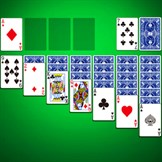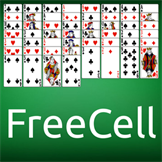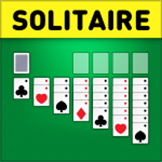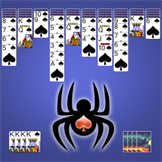
Available on
Description
FreeCell is a solitaire-based card game played with a 52-card standard deck. It is fundamentally different from most solitaire games in that very few hands are unsolvable. Although software implementations vary, most versions label the hands with a number (derived from the random number seed used to generate the hand). A version of FreeCell was created by Microsoft for release with the Windows operating system. FreeCell solitaire is one kinds of funny solitaire card game, but it's not like other solitaires. You need no luck to win, only skill is required. All cards are opened from the start and the deal has the solution, you can win, think and move wisely. Key Features: - deals with different difficulty - every completed deal has score - customizable background and card - magnetic card movement - supermove: multiple card dragging - drag or tap to move - undo option - optimized battery usage for very long gameplay Rules Construction and layout One standard 52-card deck is used. There are four open cells and four open foundations. Some alternate rules use between one to ten cells. Cards are dealt into eight cascades, four of which comprise seven cards and four of which comprise six. Some alternate rules will use between four to ten cascades. Building during play The top card of each cascade begins a tableau. Tableaux must be built down by alternating colors. Foundations are built up by suit. Moves Any cell card or top card of any cascade may be moved to build on a tableau, or moved to an empty cell, an empty cascade, or its foundation. Complete or partial tableaus may be moved to build on existing tableaus, or moved to empty cascades, by recursively placing and removing cards through intermediate locations. Computer implementations often show this motion, but players using physical decks typically move the tableau at once. Victory The game is won after all cards are moved to their foundation piles. Various computer versions of Freecell occasionally deal unsolvable games. History One of the oldest ancestors of FreeCell is Eight Off. In the June 1968 edition of Scientific American, Martin Gardner described in his "Mathematical Games" column a game by C. L. Baker that is similar to FreeCell, except that cards on the tableau are built by suit rather than by alternate colors. Gardner wrote, "The game was taught to Baker by his father, who in turn learned it from an Englishman during the 1920s." This variant is now called Baker's Game. FreeCell's origins may date back even further to 1945 and a Scandinavian game called Napoleon in St. Helena (not the game Napoleon at St. Helena, also known as Forty Thieves). Paul Alfille changed Baker's Game by making cards build according to alternate colors, thus creating FreeCell. He implemented the first computerised version of it in the TUTOR programming language for the PLATO educational computer system in 1978. Alfille was able to display easily recognizable graphical images of playing cards on the 512 * 512 monochrome display on the PLATO systems. This original FreeCell environment allowed games with 4–10 columns and 1–10 cells in addition to the standard 8 * 4 game. For each variant, the program stored a ranked list of the players with the longest winning streaks. There was also a tournament system that allowed people to compete to win difficult hand-picked deals. Paul Alfille describes this early FreeCell environment in more detail in an interview from 2000. Solver complexity The FreeCell game has a constant number of cards. This implies that in constant time, a person or computer could list all of the possible moves from a given start configuration and discover a winning set of moves or, assuming the game cannot be solved, the lack thereof. To perform an interesting complexity analysis one must construct a generalized version of the FreeCell game with 4 * n cards. This generalized version of the game is NP-complete; it is unlikely that any algorithm more efficient than a brute-force search exists that can find solutions for arbitrary generalized FreeCell configurations. There are 52! (i.e., 52 factorial), or approximately 8*1067, distinct deals. However, some games are effectively identical to others because suits assigned to cards are arbitrary or columns can be swapped. After taking these factors into account, there are approximately 1.75*1064 distinct games.
Additional information
Published by
Win8 Poker Card GamesDeveloped by
Win8 Poker Card GamesRelease date
2015-08-04This app can
Access your Internet connectionMicrosoft.storeFilter.core.notSupported_8wekyb3d8bbwe
Installation
Get this app while signed in to your Microsoft account and install on up to ten Windows 10 devices.Language supported
English (United States)English (United Kingdom)
العربية (المملكة العربية السعودية)
Azərbaycan (Azərbaycan)
Беларуская (Беларусь)
Български (България)
Català (Català)
Čeština (Česko)
Dansk (Danmark)
Deutsch (Deutschland)
Ελληνικά (Ελλάδα)
Español (España, Alfabetización Internacional)
Español (México)
Eesti (Eesti)
فارسی (ایران)
Suomi (Suomi)
Filipino (Pilipinas)
Français (France)
עברית (ישראל)
हिन्दी (भारत)
Hrvatski (Hrvatska)
Magyar (Magyarország)
Indonesia (Indonesia)
Italiano (Italia)
日本語 (日本)
Қазақ Тілі (Қазақстан)
한국어(대한민국)
Lietuvių (Lietuva)
Latviešu (Latvija)
Македонски (Северна Македонија)
Melayu (Malaysia)
Norsk Bokmål (Norge)
Nederlands (Nederland)
Polski (Polska)
Português (Brasil)
Português (Portugal)
Română (România)
Русский (Россия)
Slovenčina (Slovensko)
Slovenščina (Slovenija)
Shqip (Shqipëri)
sr-latn-cs
Svenska (Sverige)
ไทย (ไทย)
Türkçe (Türkiye)
Українська (Україна)
O‘Zbek (Oʻzbekiston)
Tiếng Việt (Việt Nam)
中文(中国)
中文(台灣)
中文(香港特別行政區)
Additional terms
Terms of transactionReport this product
Report this product for illegal content















